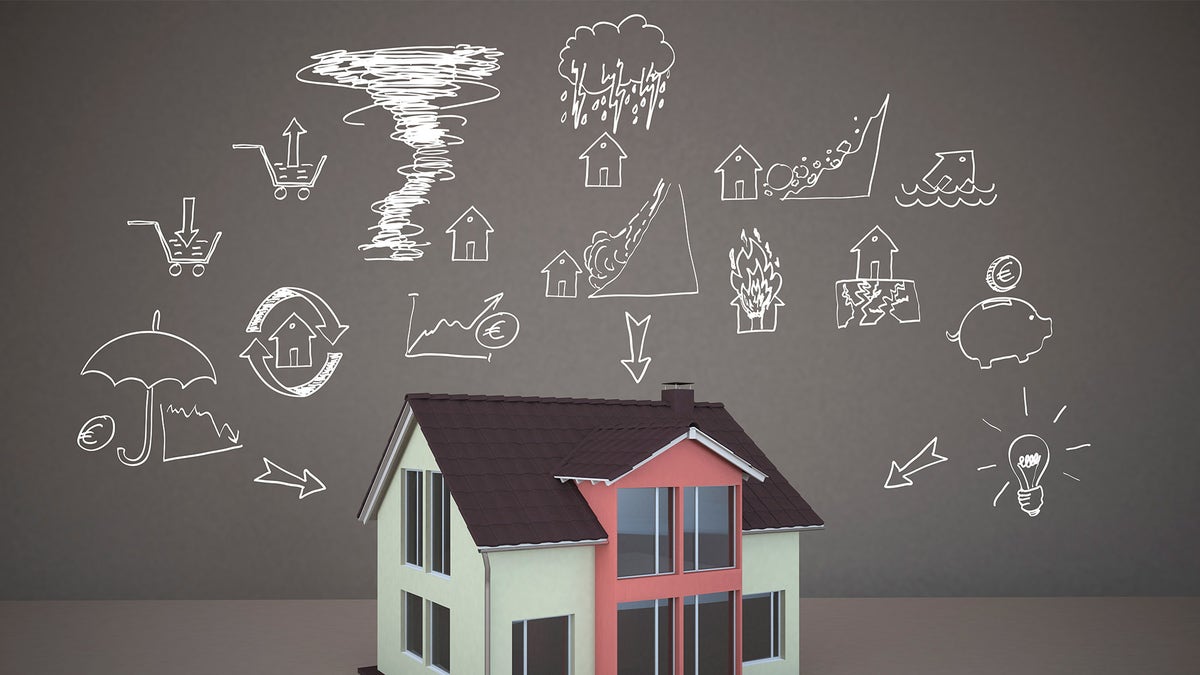
threats to a house
You've already done all the hard work.
You searched endlessly for your dream home, negotiated the price, and got all of your financing in order. But before you turn the key on your new life, you need to protect your investment -- and everything inside of it.
Even if you have never shopped for home insurance -- or if you just haven't purchased a new policy in a while -- there are a few things to keep top of mind as you navigate the course.
How much is this going to cost?
We get it -- you already plunked down a gut-wrenching amount of money for the house and the fees and the closing costs. Now you have to shell out more cash for insurance? No, it isn't fun. And it isn't sexy. But you gotta do it. And it all starts with the premiums.
Your annual premium is the amount an insurance company will charge you every year to cover your home and its contents in the event of fire, theft, etc.
The average home insurance premium has swelled to $1,034 nationwide. You should expect that amount to increase year after year. According to a February 2015 study by the National Association of Insurance Commissioners, homeowner insurance premiums rose 5.6% in 2012 after increasing 7.7% in 2011.
Every insurance company has its own way of determining annual premiums, says Noah J. Bank, a licensed insurance broker at The B&G Group in Plainview, NY.
A few factors set your rate: the value of your home and its contents, as well as your deductible, which is the out-of-pocket amount you'll have to pay in the event of a claim. But home insurance premiums also vary by region and company. Two home insurance policies with identical coverage and limits in two different parts of the country, or even a town, could have very different annual premiums, Bank says.
Filing a home insurance claim within the past five years also increases the amount you'll pay.
"To an insurer, that increases the likelihood you'll file a claim," Bank says.
And, of course, Mother Nature plays a role. If you live in an area with a history of weather catastrophes, you can expect to pay more.
How you'll pay
The initial premium is typically due when you purchase the policy. That will cover your home and property for the first year.
Subsequent premiums can also be paid directly by you (your insurer will bill you), or you can opt to escrow the premium and have a portion of it built into your mortgage payment. Even though that bumps up your monthly costs, you might find this the best way to ensure you have enough money to cover the premium when it's due.
Timing is everything
It's never too early to start shopping for home insurance. Gathering quotes as soon as the contract is signed will help you understand how the annual premium will factor into your budget. You need to know all of your monthly costs.
You'll want to choose a policy and have it paid in full at least two weeks before closing -- otherwise you might face insurance-related delays, says Ken Davidson, principal of Eagle Independent Insurance Agency in Dallas. And you don't want disaster to strike during the one week you aren't covered. Because, well, that's how luck works sometimes (at least with us).
Know whom you're working with
An independent insurance agency or broker deals with several companies, versus captive agents who represent just one insurer. Obtain a mix of three to four quotes from both types of agents to compare premiums (even from the same companies) and coverages available. It's a fine idea to shop around.
Take inventory
As you're packing and/or unpacking, take videos or photos of your belongings and store them in the cloud as a digital home inventory. That will help speed up a claim and ensure the maximum possible reimbursement in the event of a fire, theft, or other covered disaster, Davidson says. An inventory will also help you decide which insurance policy will give you adequate coverage for your belongings, including furniture, electronics, and collectibles.
Ask about add-ons
Speaking of collectibles, if you own jewelry, artwork, wine, coin or stamp collections, or other keepsakes, Davidson suggests talking to your agent about coverage limits related to those items.
"To ensure complete protection, those may require a special rider, which increases the coverage limits as well as the annual premium," he says.
Get your docs in a row
You'll need a copy of the " insurance binder," which details the coverage values, premiums, and restrictions. But you shouldn't have to track down that information. Your agent should work directly with the mortgage lender to provide proof of coverage required at closing.